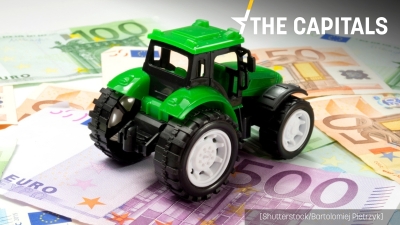Bulgaria’s Radev doubles down: ‘No ammunitions for Ukraine’

Bulgarian President Rumen Radev hammered home once again on Thursday (23 March) his opposition to sending Bulgarian ammunition to Ukraine, ahead of an EU summit expected to agree on the immediate provision of ammunition to the war-torn country.
“Bulgaria does not participate in the joint European plan to supply shells to Ukraine”, Radev told journalists, referring to the EU initiative for a joint provision of one million rounds of artillery ammunition for Ukraine within the next twelve months.
A total of 17 countries concluded an agreement with the European Defense Agency, and Bulgaria is not among them.
Radev said Bulgaria would use the capacity of its defence industry to replenish its own stockpiles and help other member states replenish their stocks.
“Bulgaria exports ammunition and weapons to many countries around the world. We have a great interest in acquiring technologies to start the production of 155mm projectiles (the NATO standard, versus the Soviet 152mm),” Radev said.
However, he made it clear that Bulgaria would not send ammunition to countries that would re-send them to Ukraine, explaining that the receiving country must specify what the ammunition will be used for.
In response to a question if Bulgaria will send ammunition to other EU countries that will send them to Ukraine, Radev curtly replied: “No.”
To a subsequent question of how he would react if the ammunition sold by Bulgaria to another country ended up in Ukraine, Radev pointed out: “This is the responsibility of the respective country. This country is obliged to let us know who is the final recipient”.
“Of course, we will set conditions,” he added.
Radev stressed the principle of participation in the initiative was the voluntary and sovereign decision of each country. Bulgaria is not the only one that has refused to participate, as nine other EU member states have also refused, he said.
Instead, he said Bulgaria was seeking peace in Ukraine.
“Bulgaria is part of the European initiative to strengthen peace”, he said.
“We highly appreciate the visit of European Commissioner [Thierry] Breton because of the traditions and the great capacity of the Bulgarian military and defence industry, for replenishing our stocks and those of the member countries,” he said.
EU Internal Market Commissioner Breton’s visit to Bulgaria on 15 March unleashed speculation that the country is being pressured to send ammunition supplies to Ukraine, a particularly sensitive subject just before a snap election on 2 April.

Commissioner Breton’s visit to Bulgaria met with suspicion
EU Internal Market Commissioner Thierry Breton’s visit to Bulgaria on Wednesday (15 March) unleashed speculation that the country is being pressured to send ammunition supplies to Ukraine, a particularly sensitive subject just two weeks before a snap election.
Freezing Russian assets – a ‘complicated subject’
In his invitation letter for the EU summit, Council President Charles Michel mentioned the need to pursue work on the use of frozen Russian assets.
Asked whether Bulgaria has frozen Russian assets, Radev indicated that he could not answer because this issue “is yet to be discussed.” He added that it was a “very complicated” topic.
An investigation by EURACTIV has explicitly proven that Bulgaria has not frozen any Russian assets since the annexation of Crimea in 2014 so far.
A divided society
The investigation found that over the last year, Bulgaria has supplied over $1 billion worth of arms to Ukraine through third countries. In recent years, even before the start of the war, Bulgaria had never directly supplied weapons to Ukraine.
The topic is very sensitive for Bulgarian society and divides politicians. Literally days after the start of the war, the then deputy prime minister and minister of economy, Kornelia Ninova, leader of the BSP, declared that Bulgaria would not deliver “a single round of ammunition” to Kyiv.
However, as a deputy prime minister responsible for the economy, she has signed the export of ammunition that reached Ukraine via third countries.
In the period of 24 February 2022 to 19 January 2023, not a single application was received for the export of arms for Ukrainian commercial companies or institutions, the Ministry of Economy confirmed in a statement received under the Law on Access to Public Information.
Bulgaria mainly imports crude oil from Russia, for the amount of €3.2 billion. This nearly three-fold increase in the value of imported oil compared to 2021, when the amount was €1.3 billion.
As EURACTIV has already reported, Bulgaria is one of the major exporters of oil products to Ukraine, especially diesel fuel with a huge part of them produced from Russian oil at the Lukoil refinery in Burgas.

Investigation: Ukraine buys huge amounts of Russian fuels from Bulgaria
In 2022, Ukraine bought a huge amount of fuels from Bulgaria made from Russian oil, according to data by the Bulgarian National Statistical Institute, provided exclusively to EURACTIV Bulgaria.



